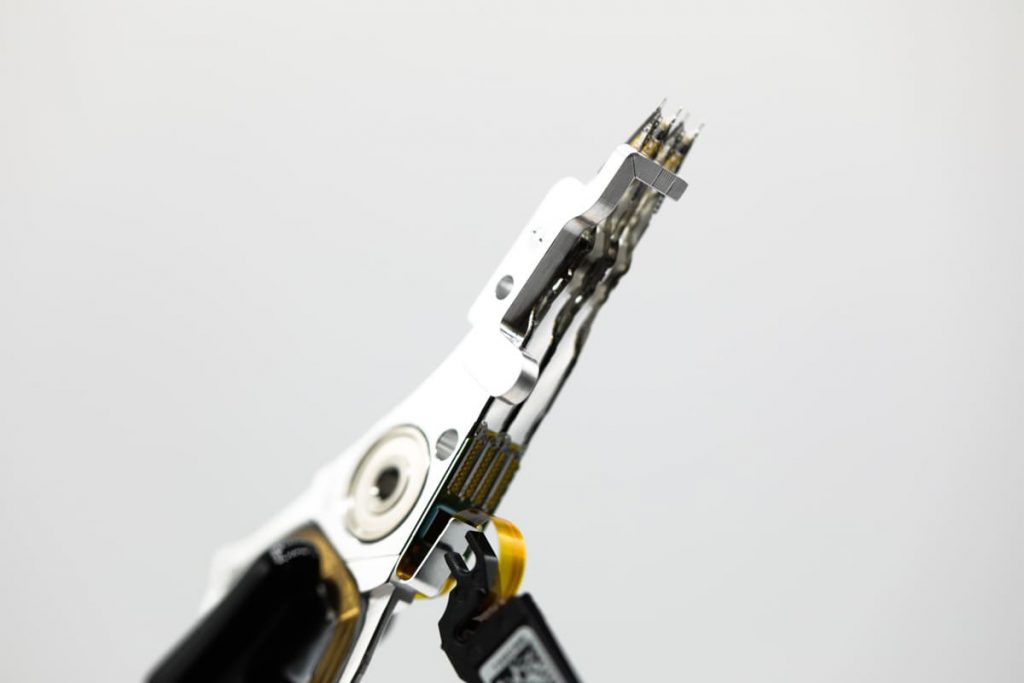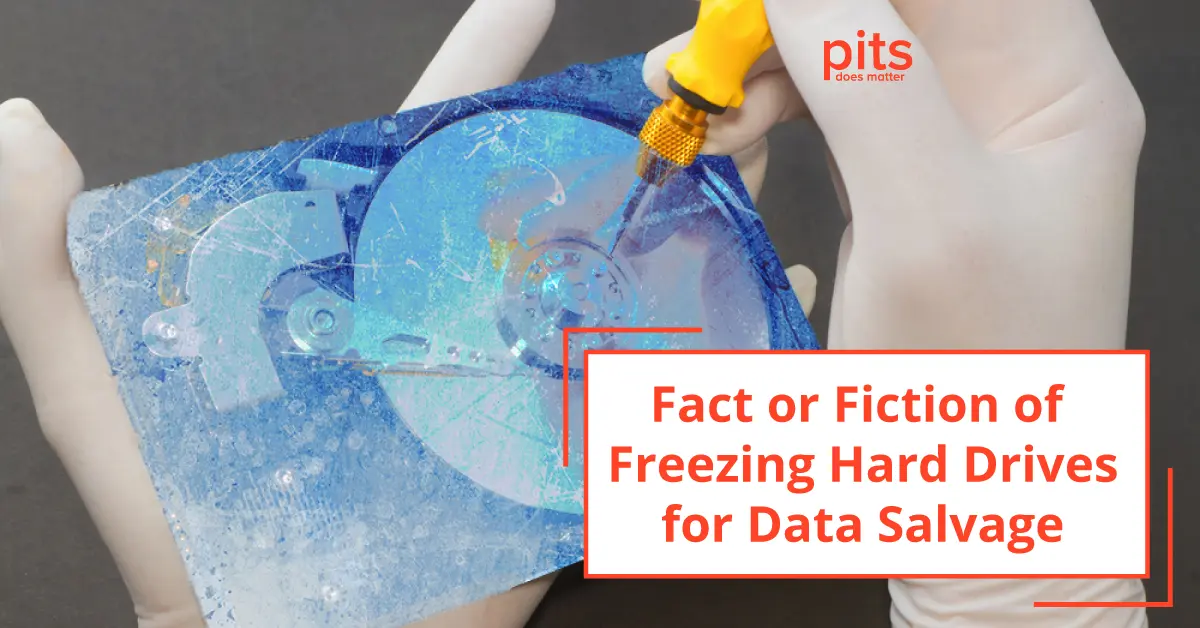The “hard drive in the freezer” trick has been a popular DIY technique in data recovery for years. It’s an enigmatic remedy that proposes that freezing a malfunctioning hard drive can allow it to be temporarily revived, thereby enabling the retrieval of essential data.
The effectiveness of the hard drive freezer trick has long been debated. Is it a legitimate solution or just a digital age myth? Our blog will provide an in-depth analysis of the science behind this method and our professional opinion as experts in data recovery services at PITS Global.
The Freezing Hard Drive Myth
At first glance, freezing a hard drive to retrieve data might seem unreasonable since hard drives are sensitive electronic devices. The prospect of exposing them to extremely low temperatures, such as those found inside a freezer, is a recipe for disaster. Nevertheless, this idea has garnered significant attention as some scientific evidence backs it.
The idea of freezing a hard drive to recover data has some scientific basis, as cooling can temporarily contract components and fix minor issues. However, it’s a risky approach, not a guaranteed fix, and can lead to further damage due to condensation. Professional data recovery services are a safer option to consider.
Understanding the Freezing Technique
The theory behind the hard drive freezer trick hinges on the physical properties of the components within a hard drive. The primary concept revolves around the expansion and contraction of materials when subjected to temperature fluctuations.
Expansion and Contraction
The hard drive freezer trick is based on how materials react to temperature changes. When you put a faulty hard drive in the freezer, the internal parts, including the disk platter and the reading/writing head, undergo a substantial temperature drop. It causes these parts to contract..
Reducing Stiction
One of the critical issues that this contraction aims to address is known as “stiction.” Stiction is a term used to describe a scenario where the reading/writing head of the hard drive becomes stuck to the disk platter.
Stiction, which is caused by tiny imperfections on the surface of a hard drive or the presence of dust particles, can prevent the read/write head from moving freely and thereby hinder its ability to read or write data effectively.

Temporary Recovery
The idea behind freezing the hard drive is that you can temporarily reduce the effects of stiction by causing the components to contract. When the head contracts along with the platter, it might break the microscopic bonds or friction that are holding them together. This temporary alleviation of stiction could allow the hard drive to spin up and function briefly.
During this limited operational window, you may have an opportunity to access and recover essential files that were previously inaccessible due to stiction-related issues. It is crucial to highlight that this approach is not a certain solution and may involve some risk. Additionally, once you take the drive out of the freezer and expose it to room temperature, moisture, and condensation may develop inside the drive, which can cause more harm.
Does Freezing a Hard Drive Actually Work?
Exploring both the upsides and downsides of using the hard drive freezer trick, we aim to provide you with the necessary information to make an informed decision regarding its appropriateness for your data recovery needs.
The Pros
- Potential Temporary Recovery. Some users have successfully recovered data from failed hard drives using this method. Freezing may provide a temporary solution for certain problems, like stiction-related problems.
- Low-Cost Attempt. Freezing a hard drive as a data recovery method is affordable and can be accomplished using ordinary household items.
The Cons
- Limited Success. Although the hard drive freezer trick may occasionally be effective, it is not a foolproof solution. It is generally not advised by most experts as the primary method for data retrieval.
- Risk of Damage. Subjecting a hard drive to extreme temperatures may result in condensation, which can harm the delicate electronics inside. Additionally, it could result in permanent harm.
- Temporary Solution. Even if the trick works temporarily, the chances of a long-term fix are slim. The underlying issue that caused the hard drive failure may persist.
| Pros | Cons |
|---|---|
| Temporary Recovery | Limited Success |
| Low-Cost | Risk of Damage |
| - | Temporary Solution |
Uncovering the Scientific Reasons for Doubt
The hard drive freezer trick is met with skepticism due to certain scientific factors:
Condensation: When a frozen hard drive is taken out of the freezer and exposed to room temperature air, moisture can form inside the drive, which can cause severe damage to the fragile electronic parts.
Mechanical Failures: Stiction and temperature are not the only factors responsible for hard drive failures. Freezing is not a viable solution for addressing mechanical failures, firmware issues, and other complicated problems.
Risk of Data Loss: Improperly attempting the freezer trick can result in more data loss, making it a risky gamble that may not be worth it.
Professional Data Recovery vs. DIY Recovery
At PITS Global Data Recovery Services, we firmly advise against relying on the hard drive freezer trick. Instead, consider these alternatives:
1
Consult a Professional
It’s important to seek help from a professional data recovery company when dealing with a failed hard drive. These experts have the necessary knowledge, specialized equipment, and cleanroom facilities to retrieve your data safely.
2
Avoid DIY Attempts
Experts recommend avoiding DIY methods such as freezing a hard drive due to the possibility of causing additional damage. In order to ensure the best outcome, it is advisable to entrust the recovery process to professionals.
3
Preventive Measures
To protect your valuable data effectively, establish a routine of regularly backing up your files. Create duplicate copies of important information and store them securely. It ensures accessibility even in unexpected situations or system failures. Periodically check and maintain your hard drives to minimize the risk of data loss. By following these best practices, your data will be safe with utmost diligence and care.
4
Data Recovery Services
Seek out the services of a reliable data recovery firm that employs skilled recovery professionals. They will offer customized solutions tailored to your particular data loss scenario.
While the hard drive freezer trick may have some scientific basis, there are more reliable and recommended methods for data recovery. We have seen many instances at PITS Global Data Recovery Services where individuals’ attempts to recover their data independently have led to more data loss or irreversible damage to their hard drives.
It would be best not to rely on myths or unverified tricks regarding lost data and failed hard drives. Trust the expertise of a professional data recovery service. Your data is far too valuable to risk.
When it comes to recovering lost data, data recovery specialists possess cutting-edge technology and extensive skills to tackle even the most difficult cases, guaranteeing the highest likelihood of retrieving your lost files. It’s important to rely on professionals for data recovery, as your data is valuable and deserves the best possible care.
Freuquently Asked Questions
Does putting a hard drive in the freezer work?
Freezing a hard drive is a debatable technique for data recovery. While it may provide temporary relief for certain issues like stiction, it’s far from a reliable or recommended solution. Most experts advise against it.
Does freezing a hard drive work?
Freezing a hard drive may temporarily fix specific problems, but its success is inconsistent. There’s a considerable risk of causing permanent damage to the drive due to condensation. It’s generally not considered a reliable approach for data recovery.
What are the risks of using the freezer trick?
There are various dangers associated with attempting the freezer trick to fix a hard drive failure, such as the possibility of moisture forming inside the hard drive and causing damage to its fragile components. Moreover, this method is not a permanent solution and may not resolve the root cause of the hard drive malfunction. It is recommended to opt for professional data recovery services, which are often a more secure option.
